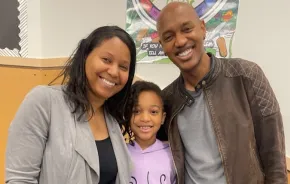Twenty-two-year-old Alexa Atkins of Bellevue has been a hostess at Chili's Grill and Bar for four years and recently began working at Starbucks. Sabah Vafaeezadeh, also 22, works restocking shelves at various stores and does volunteer work. Both young women have disabilities and have successfully transitioned into the adult world of work.
Experts say parents of kids with special needs face all the typical issues parents must confront in preparing teens for the transition to adulthood, but the preparation takes more foresight, time and effort. "The challenges are multiple, and the biggest advice that comes from families and others is to start thinking about it early because there is tremendous financial and psychological transformation involved," says John M. Neff, M.D., director of the Center for Children with Special Needs at Children's Hospital and Regional Medical Center, in Seattle.
Jodi Reimer, the Parent-to-Parent Program Coordinator for King County and the mother of Kellen, a 14-year-old boy with Down syndrome, recommends beginning with Person-Centered Planning, a program available through The Arc of King County. Geared for youth ages 14 to 21, the process empowers parents to be more focused and intentional about planning for transition.
"Person-Centered Planning is a way to get people together to talk about the individual and get things down on paper that are really going to help. It makes you feel like you don't have to do everything yourself," Reimer says.
Aspects of transition
Some of the biggest issues parents face in the transition period include health insurance, health care, legal guardianship, education, employment, housing, transportation and finances, as well as many other aspects of day-to-day living.
"Getting and keeping insurance is key," says Neff, who adds that this is often the most difficult and urgent aspect of transition. He points out that our health care system is employment- or poverty-based, which makes it difficult for individuals who don't have a job or meet low-income conditions to acquire insurance. While young adults can remain on their parents' health care policy, this can be risky: If the parents become unemployed or die, the individual can be left without coverage.
Transitioning medical care from a pediatric provider to an adult caregiver is another issue to address -- and again, experts recommend starting early. Children's Hospital and Regional Medical Center recently opened a Transition Clinic specifically focused on adolescents with special needs, one of very few working models of its kind in the nation.
"Ideally, we would start seeing a child around age 14, probably once a year to help both the child and parent see what their needs are," says Therese Vafaeezadeh, ARNP, a nurse with 25 years of experience at Children's who was selected to open the clinic. "Teens with disabilities need to know how their particular disability affects their overall health. They need to be able to recognize signs that indicate they need medical attention," she adds. Vafaeezadeh helps teen patients by creating a condensed health history that they can take to providers, so they don't have to be responsible for numerous charts and files.
Finding an adult provider can take time. Vafaeezadeh, who is also the mother of Sabah (one of the young women mentioned earlier in this article), says people with disabilities often need longer appointment times and may use medical coupons, which not all providers accept. Sometimes logistics such as getting a wheelchair into an exam room can prove difficult, she adds.
Introducing a child with disabilities to the subject of work and developing job skills is another important aspect of the transition process that can begin when children are younger and still at home. Jodi Reimer says she recently began calling Kellen's allowance a "paycheck," and increased his responsibilities around the house. Kellen also went to work with Reimer once a week this summer and did office jobs for her and other employees. When he received a paycheck, Reimer took him straight to the bank where they withdrew some cash. "We wanted him to associate the piece of paper with money. He has caught on really quickly and now he is motivated," Reimer says.
Susan Atkins, mother of Alexa (also mentioned earlier), recommends that parents start early in helping their children plan for a career. She began working on job skills with Alexa, who was born with Down syndrome, after 9th grade. "She held a part-time job every summer during her high school years," Atkins says.
"There are few supports or funding for students once they graduate or leave services at 21. They need to have already lined up their career job and be working in it with as few supports as possible," says Atkins, who notes that Alexa began her jobs at Chili's and Starbucks with the help of a job support person but now works primarily independently.
Matching personality with job skills is a process that takes time and experience. Alexa first worked in an office and a daycare center, and then looked at a variety of other careers before settling on her current work. "Alexa decided she wanted to work with people and be 'out front' talking and greeting them -- two things she is very good at," her mom says.
Alexa Atkins adds some advice: "Sit down wherever you are and think, what are some qualities about myself? Really think about what you like and cherish in your life. What do you want to do in your future?"
Learning to let go
The most important thing parents can do, experts agree, is to let go of their children and let them experience success -- and failure -- on their own. "No matter how complex the special need is, that child will be striving for a state of independence. He or she wants that, just like all adolescents want independence," says Neff of Children's Hospital. As true as this may be, it can be challenging emotionally for parents to transition from a protective, advocatory role and to permit new degrees of autonomy.
Says Jodi Reimer, "At this stage, letting my son have a lot of new experiences and keeping an eye on him is important. For instance, I let him go up and order his food at McDonald's. I don't hover, but have visual proximity."
Typical of most adolescents, experience becomes a key teacher. Reimer cites an example where her son wanted to get a free refill for his drink at a place that charges for refills. "I let him go up there and ask, and sure enough they told him no. It was hard to let him do that. I didn't know if the people were going to be kind," says Reimer, who notes that the employees did treat her son respectfully.
Experts remind parents to celebrate and enjoy each milestone their child reaches on the road to self-sufficiency. It is also important that in the course of juggling daily needs with long-term planning, parents' own needs don't get lost in the shuffle. "Realize that you are going to have frustrations, that this phase is going to bring a whole new set of stressors," Therese Vafaeezadeh advises. "Then continue to do what you do, what satisfies you. Be gentle with yourself."
While this can be challenging, families can find encouragement in the words of Dr. Neff: "In over 40 years of pediatric practice, I am just overwhelmed with awe at the strength, resilience and insights of so many families with special needs. When you have a child with special needs, the strength of the family is critical. I am amazed by how families rise to the occasion, and I have the highest degree of respect for them."
Jolene Gensheimer, a Bellevue-based freelance writer, is expecting her third child in October.
Resources:
- Adolescent Health Transition Project
http://depts.washington.edu/healthtr
"A resource for adolescents with special health care needs, chronic illnesses, physical or developmental disabilities." Site also includes helpful transition stories from people with various special needs, a PowerPoint presentation, and sample transition timelines available in various languages. - The Arc of King County
www.arcofkingcounty.org
206-364-6337
Provides resources, services and support to people with developmental disabilities and their families. Most services are free. Web site has an extensive list of resources available in the community. Click on resources, then education, then adult education for a list of colleges in the area with programs for people with disabilities. - Family Educator Partnership Project
www.arcwa.org/FEPP
888-754-8798
Has coordinators in each educational service district that can help parents and educators with school issues -- especially transitions. - Fathers Network
www.fathersnetwork.org
425-747-4004, Ext. 4286
A support system geared specifically toward fathers. - Healthy and Ready to Work National Center
www.hrtw.org
Site provides information, resources and connections regarding many aspects of transition health care. - Maternal and Child Health Bureau
www.mchb.hrsa.gov
301-443-2170
U.S. Department of Health and Human Services site has information about current issues and legal rights, and a variety of resources and links. - Metro Access Transportation System
www.transit.metrokc.gov
Click on services or call 206-263-3113 ( 206-263-3116 for TTY users) for information about bus services and reduced fares available for people with disabilities. - National Dissemination Center for Children with Disabilities
www.nichcy.org
800-695-0285
Click on A-Z topics, click T, then click Transition: Adulthood. Extensive information about education and transition, including Individualized Education Plans (IEPs) for schools. - The Neurodevelopmental Transition Clinic at Children's Hospital and Regional Medical Center
www.seattlechildrens.org/our_services/clinical_services/
206-987-2210 - Parent-to-Parent Support Programs
www.arcwa.org
800-821-5927
Provides support, information and education to families of children with special needs. Parents can request a mentor for assistance during the adolescent transition. - Person-Centered Planning
For more information contact:
Jodi Reimer, 206-364-4645, Ext. 121
or Richard Wilson, 206-364-6337, Ext. 127 - Post-ITT
www.postitt.org
Includes resources and activities for help with the transition from secondary to post-secondary education. - Puget Sound Personnel
www.pspwork.com
425-562-1231
An employment agency for people with disabilities in King County. They offer career assessments, training and follow-up support for their clients. - University of Washington DO-IT program
www.washington.edu/doit
206-685-DOIT (3648)
Program that uses technology in education and the workforce for adolescents with special needs.









